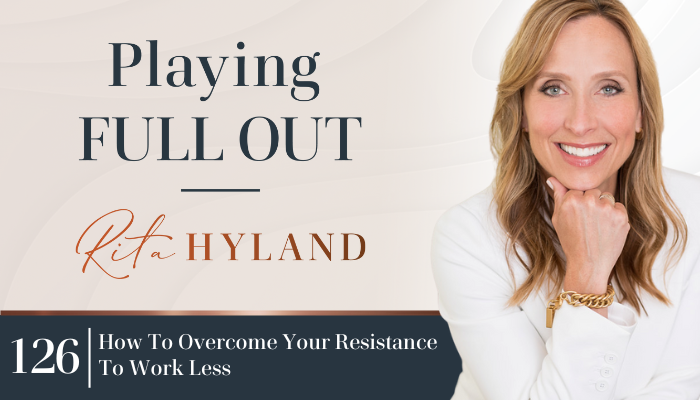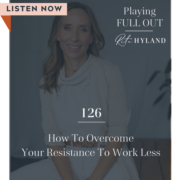How To Overcome Your Resistance To Work Less

Listen to the full podcast episode to learn about the science-backed practice that has not only changed my life but also the lives of countless people over the last two decades. This is something you can’t ignore if you want to achieve that great goal you identified for this year and write your new future.
Do you have a deep desire to work less but find it difficult despite how much you want to?
You’ve heard the solutions:
- delegate more
- hire more people
- get better technology or a smarter time management system
Any of these ideas can work temporarily.
But what happens when you get the additional resources, or you finish the project, and you still find that you are working more than you want?
Many of today’s driven high performers want to work less — and worry less when they do. So why is it so difficult?
There are 3 motivations that may keep you working hard instead of slowing down no matter how hard you try to make the change.
To break the pattern we have to accurately identify our true motivation or the problem will persist.
Too often we attempt to solve this problem of working less with the wrong prescription. Then we get more critical of ourselves when we fail.
Even worse is we unwittingly teach the next generation to operate in the same manner — never slowing down — while also being absent from them.
It’s not your fault if you’ve gotten here. It is, however, your responsibility to change it.
Let’s look at the real reasons we have such a hard time working less without worry. It has everything to do with understanding our motivations.
The 3 motivating factors:
- A deep desire for approval. Is your worth dependent on what you do?
Many of us believe our work validates our worth. And our culture has perpetuated the conditioning that we’re as good as our last accomplishment.
I had a client tell me that his organization regularly states, “Remember, you’re only as worthy as your last result.”
This cultural conditioning starts when we are children. We learn that when we achieve, we receive praise and rewards. We learn our value correlates with our accomplishments or achievements.
I was constantly overworked in my earlier days, attempting to please and perform for everyone. And it wasn’t until I was on short-term disability at a very young age that I realized it was a result of my belief that my worth was dependent on what I did.
My unrelenting internal pressure to achieve, get approval, and feel worthy was what prevented me from working less. It took a breakdown of my body for me to see this.
- A desire to feel in control
We can slow down and work less, which means we’re turning over control. Or so we think. We tell ourselves that others aren’t as capable as we are. That they can’t do it as well as us. Then we prove it to be true by not asking, empowering or adequately training those who could help us.
We don’t just fear everything will be out of control if we work less and we don’t have control. We also feel that if we don’t control, that might mean that another person becomes in control of us.
Control can be a big motivator and the reason we won’t work less. When we feel a need to be in control and conquer, we can be assured we are going in the wrong direction.
- A wanting to feel safe
We could lose things and that makes us not feel safe. We get worried that we’ll lose clients, that our companies won’t run as efficiently, we’ll lose money, we won’t be prepared enough for the next disaster—and on and on.
So, our need for safety and security is there each step of the way, directing our next steps. It’s a very primal place from which to lead our existence.
We find ourselves working more and more, taking on additional responsibilities simply because we think that will keep us safe. But what often happens is that we work ourselves out of relationships, away from our kids, into a health crisis or other catastrophe which keeps us running for more safety.
If you’re someone who wants to work less and do so without worrying, know that what’s stopping you is not that you haven’t got the right people or the right strategy or that you just haven’t figured it out yet.
What keeps you from working less is that you’re being motivated in your stressed-out moments by a primitive want for approval, control, and/or safety.
It’s not a delegation problem or a strategy problem. It’s an approval, control, or safety problem.
The worst part is that actually getting the amount that the brain needs to feel approved, in control or safe is impossible, because just like a drug – you need more and more to get your “fix.”
The only way to do that – you guessed it – keep working at it and never slow down.
It’s liberating to understand what is really at the root of the problem, as opposed to spending your days trying and failing to fix it only to get get engaged in more self-defeating talk.
These motivators come from deep-seated conditioning and unwritten rules that we have made with ourselves that this is how we will survive and succeed.
Knowing we are doing it for one of these reasons—it doesn’t matter which reason—helps us to take the next right actions.
Whether it’s our need for approval, safety, or control—we’re operating from a source of fear versus trust.
In that space of stress, negativity, and fear, we are always going to be performing at a fraction of what we’re capable of.
And because we are inherently operating from a place that’s dropping tons of cortisol and adrenaline into our body versus a place of peace, our well-being will always be a fraction of what it could be too.
Understand that none of these 3 motivations for approval, safety, or control are “bad.”
It is simply that overusing them as a means to cope prevents us from achieving our goal: working less.
Continuously ask yourself, “What is my motivation here?”
- The first step is noticing these patterns or “catching yourself in the act.”. This simple act releases you from that negative conditioning.
- Once you see the pattern, the next thing to do is to challenge its validity.
For example, ask yourself, “Has there ever been a time when you were not working hard, and things still happened?” or “Have things gone just fine without me being in the center of it?”
Imagine the difference it would make in your life to put your energy into moving closer to your dreams versus those overused coping mechanisms (the desire for approval, safety, and control) that are holding you back.
We must rethink this cultural conditioning and the unwritten rule in our homes and organizations that say working hard creates success.
Working less, achieving more, and doing so without worrying is 100% possible!
It may be different, but it doesn’t have to be difficult. Just because you haven’t done it for the first half doesn’t mean you can’t do something different starting now.
If working less and continuing to be successful or achieving more is your desire for the year, I encourage you to look at which of the three coping mechanisms you may be overusing.
Is it approval, control, or safety?
What’s really behind your resistance to working less? That is the ultimate question.
Then remind yourself that it’s only you who can make the choice and take the actions to change your life.
When you change your perspective, your reality changes.
These cups of approval, control, and safety are all meant to be filled inside—by you. Do not wait for circumstances and conditions external to you to fill them.
Stop waiting for circumstances to line up so that you can work less.
Look for areas in your life where you have tended to overcommit yourself or how often you’re expecting and preparing for bad outcomes.
The bottom line is we’re not unable to work less for the reasons that we think. And when we can see that clearly and own it—we actually can work less and let go of worrying while we do.
If you’re ready to overcome the pressured pace while you improve performance and freedom contact me for a connection call.
It’s never too late to create a career that wows you and a life aligned with your priorities and aspirations. When you clear where you are resisting your next level, you can become a magnet of tremendous happiness and success.
In this episode, I share:
- The ways we are conditioned to work hard by our parents, role models, and society
- How to accurately assess what keeps us from slowing down so that you can change it
- Three coping mechanisms that will prevent you from ever taking your foot off the gas
- How to rethink and rewrite the unwritten rules so that you enjoy more time with your family, improving your health — or whatever else you want
Resources and related episodes:
- Tune in to the previous episode, Feeling Pressured Don’t Stay Calm — Get Excited
- Listen to episode 113: The Most Influential Practice to Write Your New Future
- Listen to episode 119: How to Hire a Strong Coach in Your Corner
- Check out the book Life is in the Transitions by Bruce Feiler
- If you’d like to be notified of when new podcast episodes are released, you can do so here: Playing Full Out
- Learn more about the Inside Out Method
- Connect with Rita on LinkedIn
Subscribe on Apple Podcasts for more tips, tools, and inspiration to lead the optimal vision of your life, love, and leadership. Remember, a half version of you is not enough. The world needs the fullest version of you at play.
___
About Rita Hyland
With over 20 years of experience as an executive and leadership coach, Rita helps leaders — emerging and established — excel in corporate and entrepreneurial environments.
Rita believes if leaders were more clear about how transformation really works and more intentional about creating what they want, their impact, success, and influence in the world would be unstoppable.
Through her coaching programs, private coaching, and masterminds, Rita shows leaders how to win consistently and create the impact and legacy they desire.
Central to Rita’s work is the understanding that you will never outperform your current programming, no matter how strong your willpower.
When you learn to use Rita’s proprietary Neuroleadership Growth Code, a technology that uses the best of neuroscience and transformational psychology to hit the brain’s buttons for change, YOU become both the solution and the strategy.
Her mission is to end talented, hard-working, and self-aware leaders spending another day stuck in self-doubt or confusion and not contributing their brilliant work and talent the world so desperately needs.

